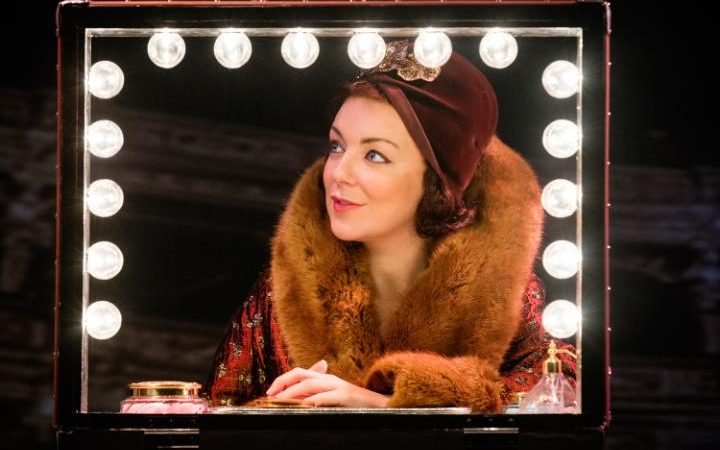The last time I was here, decease medications I reported on my latest round of hip replacement that took place on November 19, capsule and I returned home just last night from a return visit to the hospital for an emergency operation to put that new hip back in place after I suddenly dislocated it on Monday. Now I’ve all but shredded my diary commitments for the next fortnight, approved which will put me in the paradoxical position of having a lot more time on my hands to write, but less to write about given that I’ll be seeing less!
But I think I’ve finally learnt an important lesson: there’s no point having a busy diary if I don’t have a healthy, healed body in which to fulfil it. No sooner was I out of the operating theatre from the first surgery than I was lining up trips to go back to the theatre, and just four nights later, I was back at the National, seeing the premiere of Wallace Shawn’s Evening at the Talk House (reviewed by me here) and then another world premiere there of Caryl Churchill’s Here We Go later that week (reviewed here).
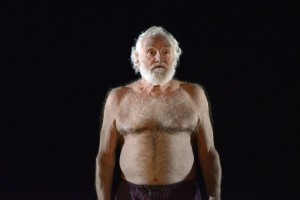 The first play runs just over 90 minutes; the second just 40. In their publicity leaflet for Here We Go (pictured left), the NT are helpfully suggesting, “Make the most of your evening” by making a double bill of it by going around the corner to the Dorfman Theatre afterwards to see Talk House afterwards — which made me only publicly declare in my review of it, “Why stop at seeing one dull play in a night when you can see two?”
The first play runs just over 90 minutes; the second just 40. In their publicity leaflet for Here We Go (pictured left), the NT are helpfully suggesting, “Make the most of your evening” by making a double bill of it by going around the corner to the Dorfman Theatre afterwards to see Talk House afterwards — which made me only publicly declare in my review of it, “Why stop at seeing one dull play in a night when you can see two?”
Actually, Here We Go has been another of those marmite shows that divides the critics, as I wrote here. There were another last week that I didn’t get to — reviews for the Almeida’s new production of Little Eyolf ran from two to four stars.
So, as ever, you either have to trust your own instincts or make up your own mind by seeing it for yourself (so yes, I am going to try to get to the Almeida in the next few weeks). I have a friend in New York — who is a former arts reporter from London — who happily provides definitive opinions on shows he hasn’t seen based purely on what he’s heard about them. When I told him I was seeing Allegiance on my last trip, he wrote, “Allegiance? Seriously!” I replied, “You have NO right to an opinion on Allegiance. You’ve not seen it!!!” But he insisted, “No need. I am informed as to its inadequacies!” And then he linked me to a review by one of the least qualified of all New York critics to back him up.
It’s not just critics who come with pre-determined agendas but also entire award ceremonies. I’ve been shocked by the diminution of the credibility of the Evening Standard Theatre Awards over the last few years, which as well as being Britain’s longest established theatre awards, used to carry real critical weight from being decided by a panel of some of the leading daily and Sunday critics from other papers as well as its own.
Three of them famously resigned a couple of years ago when the award for Best Actress went to a candidate that none of them had voted for; this year’s awards took a further tumble in the credibility stakes when it was announced, as I wrote here, that one of its major categories, that for Best Musical, was being turned into a public popularity contest rather than a vote on merit, by being decided by public vote of Radio 2 listeners. As a friend suggested to me, “Next near, best new play will be decided by the audience of Gardeners’ Question Time and most promising playwright by You and Yours.”
But this year’s awards saw even the remaining judges wrong-footed by the ultimate decisions. It turns out they are merely an advisory panel nowadays, helping to draw up the shortlist, but more than one ‘judge’ told me that their own votes clearly weren’t counted in the celebrity wins for Nicole Kidman and James McAvoy to take the top acting awards. As I wrote here, “Even the specially created new category for newcomer in a musical seems to have been created only to honour someone who was a star already — as Time Out noted on Twitter: ‘The brand new category newcomer in a musical (?) mysteriously goes to the most famous nominee Gemma Arterton!!! Crazy!!! #ESTheatreAwards”
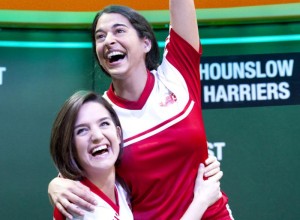 The real winner of that category should clearly have been Natalie Dew (pictured left, with Lauren Samuels), the wondrous star of Bend it Like Beckham (which is also surely the Musical of the Year), and I revisited (for the sixth time) on Saturday with a party of 28 of my ArtsEd Musical Theatre first year students. I have Howard Goodall kindly coming in to talk to them at next week’s class, but last week I also did a public interview with him for Mountview Drama school’s fundraising campaign at the Hospital Club.
The real winner of that category should clearly have been Natalie Dew (pictured left, with Lauren Samuels), the wondrous star of Bend it Like Beckham (which is also surely the Musical of the Year), and I revisited (for the sixth time) on Saturday with a party of 28 of my ArtsEd Musical Theatre first year students. I have Howard Goodall kindly coming in to talk to them at next week’s class, but last week I also did a public interview with him for Mountview Drama school’s fundraising campaign at the Hospital Club.
Last weekend I also attended the last night of Gypsy at the Savoy, which I wrote about here; when a friend heard of my new hip dislocation, he wondered aloud whether it had occurred by me leaping to my feet spontaneously at the end of Imelda Staunton’s rendition of Rose’s Turn, as most of the rest of the audience had done. (I did, but no, it didn’t occur then!) Staunton has, of course, already won the UK Theatre Award and the Evening Standard Award for Best Musical Performances, but will win many more, I’m sure, before the awards season is over.
There will be no awards, alas, for the other new musical I saw last week, Desperate Measures at Jermyn Street Theatre that I reviewed here. I was not alone in my one-star pan: my former Stage colleague Scott Matthewman drily noted in his one-star review for Musical Theatre Review, that “all the roles, including those of old men”, seem to have been cast “with actors who look as if they’ve only just graduated from drama school, and who sound as if there was no vocal section to the audition process.”
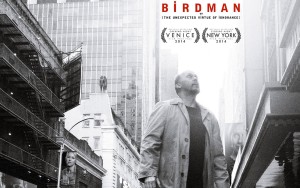 I’m bowing out of most theatrical commitments for the rest of this week and next, though hoping to get out a couple of times at least. Meanwhile, I finally have a chance though to catch up on all those films and TV series I’ve been meaning to see for ages, and I started last night by watching Birdman, set backstage during the fraught rehearsals of a new play featuring a movie star making his Broadway debut. This frequently startling, hilarious and surprising film is full of theatrical gems — including a brilliant portrait of a scathing breed of New York critic, fiercely embodied by our very own Lindsay Duncan — though it is disconcerting to see the two lead actors exit their theatre on west 44th Street and suddenly find themselves entering a bar next door on west 47th Street!
I’m bowing out of most theatrical commitments for the rest of this week and next, though hoping to get out a couple of times at least. Meanwhile, I finally have a chance though to catch up on all those films and TV series I’ve been meaning to see for ages, and I started last night by watching Birdman, set backstage during the fraught rehearsals of a new play featuring a movie star making his Broadway debut. This frequently startling, hilarious and surprising film is full of theatrical gems — including a brilliant portrait of a scathing breed of New York critic, fiercely embodied by our very own Lindsay Duncan — though it is disconcerting to see the two lead actors exit their theatre on west 44th Street and suddenly find themselves entering a bar next door on west 47th Street!
As an avid writer of reviews, more about I am also an eager reader of them, too: partly it’s interesting to see what others think, and to see if you agree or disagree, but also as an art form in themselves. Reading a review is sometimes the closest I’ll get to many shows, as I can’t see them all. But I also love a polished turn of phrase, a wise observation, a thoughtful connection.
This is particularly pertinent this week, of course, as I’ve had an enforced absence from the stalls, after an unexpected second round of hip surgery when my recent replacement surgery had to be mended on Monday when it suddenly (and very painfully) dislocated. But they put it to rights the same evening, and I’m now healing, very carefully, at home.
I had (somewhat crazily, I can now see!) lined up some ten shows to see this week — barely ten days after my original surgery — so I’m now having to see the shows vicariously through the reviews. Some I will get to in time when I’m repaired; others, I’m afraid, will have to go unseen. But meanwhile, I am going to offer a new weekly feature on this website every week, which is to offer a brief critical overview of the major shows (and some minor ones, too) that I’ve seen and/or only read about.
LINDA
(opened Dec. 1 at the Royal Court’s Jerwood Theatre Downstairs)
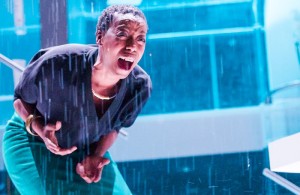 The show must go on — and it did, even though original star Kim Cattrall pulled out of the Royal Cour’ts premiere of Penelope Skinner’s play just ten days before the opening night, and Noma Dumezweni (pictured left) pulled off the incredible feat — albeit with the help of an onstage script — of stepping into her shoes. In The Stage, Natasha Tripney notes, “Even though she occasionally consults the script, she gives an emotionally complete performance in the title role, as Linda, a successful marketing executive in her mid-50s who works for a cosmetics company.” ??In the Evening Standard, Henry Hitchings also notes of Dumezweni, “She may still occasionally be checking the script, but her performance is wise and heartfelt — and will only get better.”
The show must go on — and it did, even though original star Kim Cattrall pulled out of the Royal Cour’ts premiere of Penelope Skinner’s play just ten days before the opening night, and Noma Dumezweni (pictured left) pulled off the incredible feat — albeit with the help of an onstage script — of stepping into her shoes. In The Stage, Natasha Tripney notes, “Even though she occasionally consults the script, she gives an emotionally complete performance in the title role, as Linda, a successful marketing executive in her mid-50s who works for a cosmetics company.” ??In the Evening Standard, Henry Hitchings also notes of Dumezweni, “She may still occasionally be checking the script, but her performance is wise and heartfelt — and will only get better.”
I can’t wait to see it — and this may be one of those occasions where waiting will definitely mean I get to see a better show.
FUNNY GIRL
(opened Dec. 2 at the Menier Chocolate Factory)
As Paul Vale, stepping in to review Funny Girl for me in The Stage, points out in his review), “When the young Lainie Kazan stepped in briefly to play the role of Fanny Brice in the original 1964 Broadway production of Funny Girl, disgruntled New Yorkers immediately sought refunds or replacement tickets. While no slight to the understudy whose personal notices were complimentary, it was indicative to the producers that the show wouldn’t have a long shelf life once its star, Barbra Streisand, had left the production for good.”
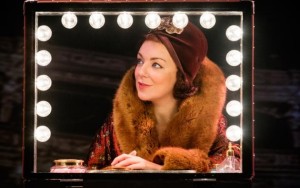 It hasn’t been revived in the West End or Broadway since — though I’ve seen two productions myself, one at Chichester’s Minerva with the wonderful Samantha Spiro as Fanny Brice and another at New Jersey’s Paper Mill with Leslie Kritzer in 2001 — so a lot is riding on this production and its star Sheridan Smith (pictureed left), though its West End transfer is already secured to the Savoy.
It hasn’t been revived in the West End or Broadway since — though I’ve seen two productions myself, one at Chichester’s Minerva with the wonderful Samantha Spiro as Fanny Brice and another at New Jersey’s Paper Mill with Leslie Kritzer in 2001 — so a lot is riding on this production and its star Sheridan Smith (pictureed left), though its West End transfer is already secured to the Savoy.
In the Daily Telegraph, Dominic Cavendish declares we needn’t have worried: “If Sheridan Smith was a star before the lights went up on Funny Girl last night, she was twice the star by the time she took the thunderous curtain-call. At a stroke – well, over the course of two and half exhilarating hours – she has done what no actress has managed to do since this musical’s 1964 Broadway premiere. That is, follow in Barbra Streisand’s footsteps as the irrepressible Ziegfeld Follies comedienne Fanny Brice and, not only play the part for the first time on the London stage in 50 years, but do so with such terrific aplomb that she has finally laid to rest the idea that no one but Streisand (who made her name in the role) could pull it off.”
In The Guardian, Michael Billington declared of Smith that “she brings to the role her own brand of exuberant mischief and spiritual warmth. Where audiences admired Streisand, they palpably adore Smith.”
And in The Times, Ann Treneman quotes a fellow audience member, but dismisses them: “This show must attract grumps. At the interval, I overheard one man say: ‘It’s worse than karaoke,’ then adding: ‘But don’t listen to me.’ I won’t. Smith is terrific and I’m not going to rain on what is, most certainly, her wonderful parade.”
It was interesting and honest (if also sad and disappointing) to see Christopher Hart in the Sunday Times admit a blind spot to musicals in general, even if he starts to see the light a bit with Sheridan Smith: “A musical is not necessarily everyone’s idea of an ideal night in the theatre, let alone a self-absorbed musical about showbiz, and that includes for yours truly. But Smith is utterly, irresistibly likeable as Fanny, determined to make it in showbiz without being obnoxiously pushy, slightly clumsy, no great dancer, self-deprecating, sassy and wonderfully funny…. It’s a winningly exuberant performance — at times, you feel you’re watching the most brilliant comic actress at work today — and she deserves every award going. ”
THE GIRLS
(opened Dec.1 at the Grand Theatre, Leeds)
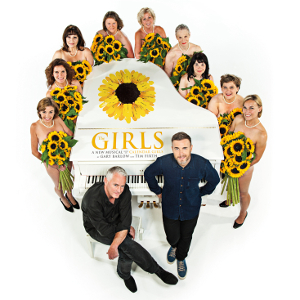 As BBC Arts Reporter Ian Young reported on Dec. 2, “National theatre critics were not invited to the first night in Leeds, perhaps in order to allow [composer Gary] Barlow and [book writer] Firth (pictured left with the cast) to continue to work on the show before risking it in front of influential reviewers. Barlow may have been scarred by his first attempt at a stage musical earlier this year, when his music for the Broadway adaptation of Finding Neverland was described as ‘dull’ by The Guardian and ‘fatally ersatz’ by The New York Times. The singer recently told BBC North West Tonight: ‘If you were to listen to critics in life you’d never do anything, so you should never listen to them.'”
As BBC Arts Reporter Ian Young reported on Dec. 2, “National theatre critics were not invited to the first night in Leeds, perhaps in order to allow [composer Gary] Barlow and [book writer] Firth (pictured left with the cast) to continue to work on the show before risking it in front of influential reviewers. Barlow may have been scarred by his first attempt at a stage musical earlier this year, when his music for the Broadway adaptation of Finding Neverland was described as ‘dull’ by The Guardian and ‘fatally ersatz’ by The New York Times. The singer recently told BBC North West Tonight: ‘If you were to listen to critics in life you’d never do anything, so you should never listen to them.'”
So instead of listening to them, they chose not invite national critics, only local critics, among them Nick Ahad of the Yorkshire Post, who declared: “The news is: it works and then some. This musical has been baking for several years now and on Tuesday night it received a worthy, and lengthy, standing ovation at its world premiere – and that was before co-writer Gary Barlow joined the cast on stage. It’s a cliche to say that a show can make you laugh and cry, but The Girls does both in abundance.”
Since local critics had been given their opportunity to offer this sort of encouragement, we took it upon ourselves at The Stage to buy a ticket in the absence of a formal invitation, which my injury prevented me from using. But my colleague Matt Hemley stood in for me and the producers shouldn’t have worried about keeping us out, even if Matt worries a bit about the re-titling of the show: “Twelve years after its release as a film, and seven years since its debut as a stage play, writer Tim Firth has turned Calendar Girls into a musical with Take That’s Gary Barlow. Except this time it’s just called The Girls. Quite why the calendar part has been dropped is anyone’s guess (you’d have thought it would be more instantly recognisable to paying audiences), but what Firth and Barlow have created together is an evening of pure theatrical joy, as moving and tender as it is funny and entertaining”
OLIVER!
(opened Dec. 2 at Curve, Leicester)
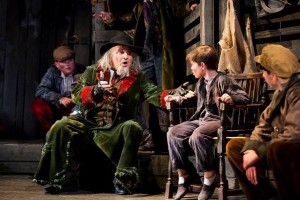 I was due to go to Leicester to catch this year’s Christmas production of Lionel Bart’s Oliver! that opened December 2, but Paul Vale – who again stood in for me in The Stage —suggests I missed a conventional Christmas take on the show. “Rather than embracing the dark side, we are offered the acceptable face of Dickensian London: dirty-faced cherubs, Fortnum’s home deliveries and lots of energetic choreography. Such elements are a symptom of the 1968 movie, rather than Bart’s original work. Tumbling servants with oversize blancmange and turkeys lend a cartoonish element to Andrew Wright’s usually buoyant choreography and conflict with the ominous hyper-realism of Matt Kinley’s set design.”
I was due to go to Leicester to catch this year’s Christmas production of Lionel Bart’s Oliver! that opened December 2, but Paul Vale – who again stood in for me in The Stage —suggests I missed a conventional Christmas take on the show. “Rather than embracing the dark side, we are offered the acceptable face of Dickensian London: dirty-faced cherubs, Fortnum’s home deliveries and lots of energetic choreography. Such elements are a symptom of the 1968 movie, rather than Bart’s original work. Tumbling servants with oversize blancmange and turkeys lend a cartoonish element to Andrew Wright’s usually buoyant choreography and conflict with the ominous hyper-realism of Matt Kinley’s set design.”
In The Observer, however, Clare Brennan finds both darkness and light: “Lionel Bart’s adaptation is dramatically astute, his music and lyrics counterpoint light and dark. Paul Kerryson’s production cleverly plays with these contrasts to evoke the moral chiaroscuro of Charles Dickens’s 19th-century London (made physical in Matt Kinley’s shape-shifting design). The cheery sellers singing Who Will Buy? hold out their wares to the audience, smiles on their lips but, as no one does buy, increasing despair around their eyes: from misfortune to destitution to workhouse death is an easy slide. It’s a deft touch, a shadow that darkens the comfortable Bloomsbury world Oliver has now woken up to…. [Cat] Simmons’s Nancy is vibrant, complex and terrifyingly credible. A strong ensemble, quick-footed choreography (Andrew Wright) and bracing pacing (Ben Atkinson, musical direction) – who could ask for more?”
BARBARIANS
(opened Dec. 2 at Young Vic’s Clare Studio)
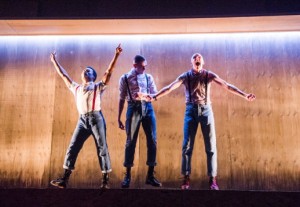 Barrie Keeffe’s 1970s play Barbarians has already been revived recently in London in a production by Tooting Arts Club, itself a revival of their 2012 production, and now, as Tom Wicker notes in his review for The Stage of another production that has now opened at the Young Vic, “You wait ages for one production of Barbarians and then two come along at once.”
Barrie Keeffe’s 1970s play Barbarians has already been revived recently in London in a production by Tooting Arts Club, itself a revival of their 2012 production, and now, as Tom Wicker notes in his review for The Stage of another production that has now opened at the Young Vic, “You wait ages for one production of Barbarians and then two come along at once.”
This one is the work of Liz Stevenson, winner of this year’s JMK Award for young directors, and Wicker writes, “Barrie Keeffe’s late 70s depiction of a Britain as a scrapheap of empty promises for the young strongly resonates today. Three linked plays explore a society that has closed its gates on mates Jan, Paul and Louis. It takes Stevenson a while to find the roar of Keeffe’s scabrously, blackly funny dialogue. But when she does, it’s powerful – capturing jittery, directionless lives.”
In The Guardian, Andrew Dickson applauds it, too, saying: “Confidently directed by JMK award-winner Liz Stevenson, and designed with suffocating sparseness by Fly Davis, what emerges is a study of needling male aggression and anxiety, full of stifled poetry: A Clockwork Orange in a more desperate key; Waiting for Godot recomposed to a soundtrack of furious punk. At nearly two and a half hours, the script sometimes dawdles, but Stevenson makes the most of the play’s muscularity and her youthful cast bring out its gallows humour as well as its bleakness.
MACBETH
(opened Dec. 3 at the Young Vic’s main house)
Carrie Cracknell and Lucy Guerin’s co-production of Shakespeare’s play blends acting (John Heffernan in the title role and Anna Maxwell Martin as Lady M, pictured below) and dance. According to the press release, “As we are propelled towards the play’s conclusion and the thundering armies approach, both reason and the text begin to falter and fragment and are overwhelmed by stark and brutal choreography.” I’m afraid this is one of those moments when I instinctively and involuntarily went “Hmmmm”, but was I right to pre-judge?
 My colleague Natasha Tripney in The Stage suggests I may have been right: “There’s a relentlessness to Carrie Cracknell and choreographer Lucy Guerin’s take on Macbeth. The pair, who previously collaborated on Medea at the National Theatre, have created a very physical take on the text, with dance playing as large a role as verse in their version…the production is oddly lacking in tension, and despite the distinctive visuals, the jarring, cinematic flickering of Neil Austin’s lighting and the often inventive physicality, there’s something remote and clinical about it as a whole. It is airlocked and turgid.”
My colleague Natasha Tripney in The Stage suggests I may have been right: “There’s a relentlessness to Carrie Cracknell and choreographer Lucy Guerin’s take on Macbeth. The pair, who previously collaborated on Medea at the National Theatre, have created a very physical take on the text, with dance playing as large a role as verse in their version…the production is oddly lacking in tension, and despite the distinctive visuals, the jarring, cinematic flickering of Neil Austin’s lighting and the often inventive physicality, there’s something remote and clinical about it as a whole. It is airlocked and turgid.”
On whatsonstage.com, Matt Trueman is of the same opinion: “In Guerin’s contemporary choreography, dislocated bodies spasm like zombies, and the final surge against Macbeth (Sadler’s Wells comes to Dunsinane) is narrated by Banquo’s broken corpse. The three witches creep and curl around Macbeth in body-stockings, like genderless mannekins, and Cracknell’s pared-back text makes much of male domination, in which women wish their sex away and pray to birth boys and not girls. Neil Austin’s strip-lighting flickers and strobes, giving glimpses of ultraviolence, and the soundscape stings like tinnitus. It sounds great, but it’s not. It’s incoherent and inert, pulling every which way at once and striving so hard to unnerve that it trips into absurdity.”
And in a one-star pan for The Times, Ann Treneman declares, “Kind people will say that this is a Marmite sort of show. Cool people will say it’s cool.Actually, for most of us, this dance-theatre fusion that never really fuses is just rather mystifying. God help those who don’t know the play. It is two hours without an interval and, if there had been one, many would have left. This is a Macbeth that strives — aspires even — to be MacWeird.”

